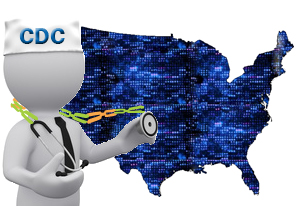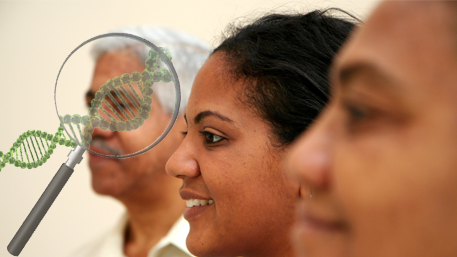Search Results
10 results for colorectal cancer
Can We have Our Genome and Eat It Too? Deploying the Whole Genome Sequence In Medicine and Public Health, One Base Pair At A Time.

This post was originally published November 3, 2011 but is still very much applicable in 2013! The popular proverbial saying “you cannot have your cake and eat it too” implies that one cannot consume something and preserve it at the same time–in other words, we cannot have it both ways. Well, for once, maybe we
Posted on by 4 CommentsFeeling the Genomic Pulse of the United States

A healthcare provider takes a good clinical history, feels the patient’s pulse, performs a good physical examination, and orders laboratory tests to diagnose and manage a health problem. In a similar manner, public health programs feel the pulse of the population by collecting data through population surveys, surveillance systems and health statistics to assess the
Posted on by 3 CommentsThe Promise of Population-based Genomic Screening for Selected Hereditary Conditions: Contributions of Cost-Effectiveness Analysis

It is estimated that 3 million people in the United States carry pathogenic variants that increase their risks for heart disease and cancer. If people with such variants are identified, medical interventions are available to significantly reduce morbidity and mortality. However, existing recommendations tend to emphasize family-based or ethnic-specific criteria to determine at-risk individuals for
Posted on by 1 CommentPopulation-based Genomic Screening Programs: The Need for Optimal Implementation to Ensure Health Equity

Population genomic screening of adults has emerged as a strategy to promote prevention of common diseases such as cancer and heart disease among persons with genetic conditions. This type of screening has the potential to identify millions of currently undetected people in the United States who are at risk of preventable diseases for which evidence-based
Posted on byPopulation Screening for Rare Pathogenic Variants as the Low Hanging Fruit for Public Health Genomics Across the Lifespan

Rapid advances in human genome sequencing technologies have accelerated the integration of genomics into clinical practice. Genomics has demonstrated clinical utility as a diagnostic tool for certain diseases, but its potential for population screening is still work in progress. In principle, DNA-based population screening can identify persons with rare pathogenic variants who are at high
Posted on by 1 CommentThe Use of Cell-free DNA in Clinical Practice: Work in Progress

A recent review outlines the use of circulating tumor DNA (ctDNA) in clinical practice and the requirements necessary to extend the use of this technology for health impact. Cell-free DNA (cfDNA) is extracellular strands of DNA present in body fluids. Circulating tumor DNA (ctDNA) is a specific type of cfDNA that originates from a primary tumor, circulating
Posted on byPolygenic Risk Scores in Clinical Practice? Still Making the Case

Two recent systematic reviews show the lack of data on clinical utility of polygenic risk scores and major challenges in implementation. The Promise of Polygenic Risk Scores in Population Health Many common diseases such as cancer, diabetes, and heart disease, result from the combination of genetic factors and physical and social environmental factors. Genome-wide association
Posted on byPublic Health Genomics Priorities Through a Health Equity Lens

Achieving Health Equity in Genomics and Precision Medicine is More Important than Ever The CDC Office of Genomics and Precision Public Health is undergoing strategic planning to identify priorities and actions for genomics and precision medicine. As we embark on this work, we are focusing on health equity. The potential for genomics and precision medicine
Posted on byPersonal Reflections on Genomics, Health Equity, and Public Health

My nephew, Eddie, and niece, Sheri, were lively, witty, high-spirited, active, bright, and full of hope. Eddie dreamed of becoming a professional baseball player, while Sheri aspired to become a mathematical engineer. But their childhood diagnoses with a type of kidney disease called nephrotic syndrome ended those dreams. While nephrotic syndrome can be inherited, we
Posted on byHow Common is Familial Hypercholesterolemia?

Familial Hypercholesterolemia (FH) is a genetic condition that leads to high blood levels of low-density lipoprotein cholesterol, also known as LDL-C or “bad cholesterol.” Most people with FH have heterozygous FH, meaning they have only one FH-causing mutation, but in rare cases, a person can have homozygous FH, meaning they have FH-causing mutations in both
Posted on by

